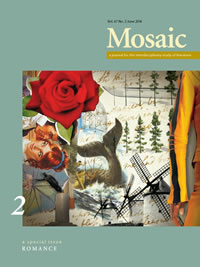Issue 47.2
Overview

Special Issue: Romance
Published: June 2014
View the issue introduction or see the issue summary and contents below.
13 essays, totalling 224 pages
$24.95 CAD
This Mosaic special issue engages the rich history of the word “Romance,” with essays on “the romantic,” the roman, romantic fiction, Romanticism, “the Romantics,” and the state of the love story in literature and film.
‘That Darker, Though Truer Aspect of Things’: Melville’s Failed RomancesZachary Lamm This essay explores ways in which Herman Melville’s romances, including Pierre and Moby-Dick, simultaneously utilize and undermine the conventions of the romance as defined by Nathaniel Hawthorne. The visionary work of the romance is undercut by Melville’s skepticism toward fantasy, resulting from his perception of the inescapability of material culture. | |
Antonin Artaud and Freud’s ‘Family Romance’: The Transgressive SublimeLynn Hughey Engelbert Freud’s family romance and Romantic idealism conjoined in Antonin Artaud’s work such that repetition and transference became accompanied by a Romantic quest for a strange and more sublime aesthetic order. This was both a psychological system and a philosophical perspective that negatively and energetically influenced his radical and existential forms of self-identification. | |
‘Going Native’: Aca-Fandom and Deep Participant Observation in Popular Romance StudiesCatherine M. Roach This essay explores an experimental method for how an academic interested in popular romance fiction might study this bestselling genre. It sets out a practice for negotiating the “aca-fan” tension in the growing field of popular romance studies, based on methods of the aca-fan-writer, observant participation, and performative ethnography. | |
My Metatextual Romance: Thinking With (and About) Jaane Tu Ya Janne NaEric Murphy Selinger Scholars of popular romance fiction have begun to credit the genre with political and aesthetic self-consciousness, a “metatextual turn” that parallels changes in the academic reception of Hindi popular cinema. This essay brings some of these new theoretical models to bear on the Indian romcom Jaane Tu Ya Jaane Na. | |
Fatal Attractions: ‘Snuff Fiction’ and the Homicidal RomanceDeborah Wills This essay explores the eroticized violence of the serial-killer romance or “snuff fiction,” tracing the history of the “lust-killer” from his Gothic roots to his post-Gothic incarnations, and exploring the genre’s penetrating critique of pop-culture romance conventions through its brutal portrayals of the homicidal romance. | |
Global Subjects of Poetry: Power and Discourse in PoetryXingbo Li To argue for the utility of comparing poetic tropes across cultures, this essay takes up French and Chinese poems (by Baudelaire and Li Bai) using tropes of wine and inebriation. A critical analysis demonstrates how the base tropes are expressed in terms of their source cultures’ power relations. | |
Echoing Romance: James Cameron’s Avatar as EcoromanceMarsha S. Collins This essay examines Avatar’s echoing of longstanding romance conventions while creating ecocentric romance or ecoromance, providing insight into the ecological ideology that informs the movie, while suggesting how and why romance remains such an enduring and popular fictional form. | |
Revenge and the Family Romance in Tarantino’s Kill BillLesel Dawson Quentin Tarantino’s Kill Bill realizes a primary revenge fantasy in which the murdered victim is also the triumphant revenger who seemingly rewrites the past and resurrects the dead. Avoiding revenge’s conventional tragic ending, the film moves toward romance, the genre associated with reunited families and wish-fulfilment. | |
Irreverently Unromantic: A Rhetorical Path to Sophistic Poetics in the Poetry of Bob HicokBrian Hendrickson Rhetorical analysis of Bob Hicok’s earliest and most recent poems reveals how the poet modifies the terms of the central problem in contemporary poetry—Romantic irony—by employing an irreverent poetics I describe as sophistic to highlight its rhetorical tendencies while differentiating it from the inverted Platonism of Romantic irony. | |
Love’s Shadow: The Unconscious Underside of Romance in Hardy’s The WoodlandersBarbara Schapiro This essay uses Stephen Mitchell’s psychoanalytic relational theory to explore the unconscious dynamics of romance in Hardy’s The Woodlanders, examine how aggressive, sexual, and idealizing fantasies determine as well as destabilize romantic love, and how passion is structured by the tension between subjective fantasy and external reality. | |
John Phillips, John Milton, Don Quixote, and the Disenchantment of RomanceAnna K. Nardo In 1687, Milton’s nephew and pupil John Phillips published a translation of Miguel de Cervantes’s Don Quixote [. . .] Now Made English According to the Humour of our Modern Language. Although condemned as a vulgar travesty, Phillips’s adaptation extends our understanding of the disenchantment of romance in the seventeenth century. | |
Idiocy and Aberrancy: Disability, Paul de Man, and Wordsworth’s ‘Idiot Boy’Claire Laville This essay approaches Wordsworth’s “Idiot Boy” by way of juxtaposing disability studies scholarship with deconstructive readings proposed by Paul de Man. | |
Dearly Beloveds: The Politics of Intimacy in Juliana Spahr’s This Connection of Everyone with LungsHeather Milne This essay examines how Juliana Spahr’s collection of anti-war poetry, This Connection of Everyone With Lungs, engages the potential of the political lyric to advance a poetics of global intimacy and to explore themes of connectivity and complicity in the context of 9/11 and the U.S.-led Invasion of Iraq. |